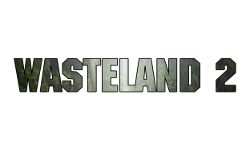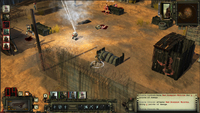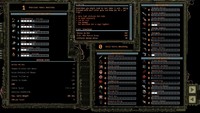|
|

|
PLATFORM
|
PC
|
BATTLE SYSTEM
|

|
INTERACTION
|

|
ORIGINALITY
|

|
STORY
|

|
MUSIC & SOUND
|

|
VISUALS
|

|
CHALLENGE
|
Easy
|
COMPLETION TIME
|
More than 80 Hours
|
|
OVERALL

|
+ Lots of content and choices
+ Solid foundation for gameplay systems
+ Excellent writing and scenarios
- Numerous, minor interface problems
- Lacking progression in combat and abilities
- Moments impacting the world can be unclear
|
Click here for scoring definitions
|
|
|
Wasteland 2, a sequel to an '80s classic and a spiritual successor to the '90s Fallout titles, was a game few were clamoring for, but many fans of computer RPGs were eager to support through Kickstarter given the opportunity. There is a tricky line to walk here, creating a full-length modern game that draws inspiration from two sets of similar, distant ancestors among a growing swell of competition as more and more crowd-funded dream projects pump out old-school computer RPGs. Wasteland 2 is a solid, satisfying experience that trips up only when it relies too heavily on '80s mechanics and too lightly on modern ones.
Wasteland 2's setting is as generic as a post-apocalyptic world can be, and those who didn't play the original or weren't born in 1988 will get a rundown of its straightforward plot in the first few hours. In this world, a group of ranger squads work out of a HQ in New Mexico, patrolling the immediate area for danger, eliminating risks to humanity, and helping with the region's survival like a mix between engineers, marines, and sheriffs. In the eyes of a ranger, they spread law and order, though their actions usually come down to shooting treacherous people and creatures without expressing much moral sense or empathy. The desert is the largest obstacle to emerging settlements; food and water are the greatest allies. Unsuspecting strangers drift in a grey area between the two.
The player takes control of a squad of newbie rangers sent to investigate a murder. While alone in the middle of the desert, two communities critical to survival are simultaneously attacked, and without much background information, the player's squad must choose which to save. In this game, even saving a community isn't black and white. Towns have competing factions, conflicting goals, and wars in progress. Everyone is a little evil and a little good, selfish and giving, barbaric and civilized, and they all think they know the truth of wrong from right. Like a lawful-neutral bulldozer, the player rolls through areas, deciding who gets demolished and who is left standing, often making choices before the full scope of situations are known. Not choosing a side can be the worst choice to make.
This is Wasteland 2 at its best. The main quest sends the rangers to the far reaches of the world in search of signal-boosting radio towers, which all happen to be in the middle of well-guarded settlements. The scenarios are diverse and creative. There are some retreads here for anyone overly exposed to post-apocalyptic media, but even those are fun to navigate. There's always a sense of wonder when a new community is found and the eyes of a ranger are upon them. Will it be under attack by robots and require a lightning-fast sweep? Will there be two warring factions to meet and choose between? Will there be a peaceful, established faction in control with a hidden one looking to usurp? Each town is different, and considering how much content there is in this massive game, it keeps things fresh in a very human world.
 The log's writing in the retail version is more colorful than this, to say the least.
The log's writing in the retail version is more colorful than this, to say the least.
|
|
The implementation has flaws, though. As Kickstarter bullet points, survival mechanics requiring water to be carried, a modular interface, conversation through keywords, and a world mostly filled with desert sound cool, but none are practical and they give the game a retro vibe in an obstructive way. The interface is the largest problem. Writing is displayed in a scrolling log that's too small and out of the way to casually pay attention to. Triggers for log text can be tightly knitted in the world, causing a short stroll to dump several paragraphs of entertaining or necessary information into a tiny window incapable of displaying it all. When a keyword is moused over in conversation, the ranger's exact line is temporarily displayed. In most situations, clicking on keywords leads to exposition and background info, but very rarely an innocuous word will initiate a threat to the NPC or start a fight if clicked, which the player can do unintentionally if he isn't stopping to read every moused-over line first. It's a terrible way to handle something so important to the game, and not worth the '80s nostalgia when the bulk of the screen isn't utilized during conversations. There is plenty of space to display dialogue options as complete sentences rather than vague keywords. A wonky camera that can have a mind of its own and inventory management are the least unusual woes. The interface is customizable to a degree, but not in ways that solve the wrongs you're going to see.
The execution of player agency is a mixed bag. As great as it is to have so many options in how to impact the world, Wasteland 2 frequently sets the player up to fail. Trivial actions that don't appear to matter can have serious, undesired consequences that are only discovered much later on. Conversation skills only appear once per opportunity and must be used immediately or never, encouraging them to be clicked, but they can have unexpected or unwanted consequences. Many events are on a hidden timer that's unknown to the player. NPCs can die if the squad doesn't high-tail it to the right place at the right time. Other times, there's no rush, but there's no way to know the difference. Some gamers will be infuriated by the player agency mysteries and reload until a scenario works out perfectly. Others might not care and take bad outcomes in stride. It's a rough world even when the eyes of a ranger are upon you, and this could easily be a pro or a con depending on the player's attitude. Regardless, the game gives the sense that its scenarios were designed to be replayed or attempted multiple times. This is certainly doable and could be fun, but more transparency or at least fewer unexpected failures would be nice.
 A smart, well-rounded character build.
A smart, well-rounded character build.
|
|
Combat and character growth work fine, but are on the basic side. Battles are a typical turn-based computer RPG affair with base stats driving accuracy, speed, initiative, and damage. Although there are cover mechanics and a couple of aiming options that affect accuracy and damage, they are simple and this is not a tactical game. There's no targeting limbs, no combat abilities, no meaningful status ailments to inflict, no crippling effects, nor any negative effects given to nearly dead opponents, contrary to most games in this style. It's simpler than even Fallout 1, much less others like the Infinity Engine titles and recent releases like Divinity: Original Sin and Shadowrun. There is no issue here in and of itself — the simplicity lets battles move at a fast pace for turn-based squad combat — the issue is that a lack of diversity and an inundation of enemies lead to repetitive actions and strategies that get old quick. Other than damage, HP, and armor slowly increasing for friends and foes, combat is exactly the same ten hours into the game as it is eighty hours into it.
Character growth is similar to Fallout's SPECIAL system. One excellent tweak comes in how base stats impact multiple derived stats in meaningful ways. A ranged fighter might still want some Strength, otherwise his HP will be low. A melee fighter needs Speed or he'll get showered with bullets while taking multiple turns to reach the enemy. It discourages min-maxing — tanking any stat down to one will have noticeable consequences in battle regardless of build — and requires some more careful thinking than this type of system usually does. Extra attribute points are given sparingly throughout the game, but otherwise the initial set-up is critical to success. Unfortunately, there's nothing clever about skills. A few points are given each level to assign to a list of combat and non-combat abilities, and here specialization is necessary since the world's locks, traps, and weapon modifications level up aggressively.
Presentation and technical values are functional to the point of being almost unnoteworthy. Locations are unique enough that the world doesn't look like an intern spent a weekend copying and pasting to make it. It's also visually detailed enough and interesting enough, although it does double down on monotonous desert and post-apocalyptic color schemes. The music is fine, however the real audio treat is in the radio chatter. The radio can spit out messages from NPCs at any time. These add greatly to the setting, are all expertly voiced, and some nifty thought was put into altering the quality of the radio signal depending on where it is coming from. Other than the radio and a few major NPCs, there's next to no voice acting. In what seems to be typical for Unity, the game's memory and disc space requirements are suspiciously large, but load times are quick and it runs well.
Considering how enormous Wasteland 2 is, the impressive emphasis on player agency, and the crowd-funded budget, there are many ways that things could have gone south for inXile and didn't. The setting is consistently engaging. Strong writing augments it and brings it to life with over-the-top, black-comedy log messages. The second half of the game takes place outside of New Mexico and drops all of the desert-inspired mechanics and themes, resulting in a much tighter, faster experience that ramps up to a conclusion complete with dozens of potential ending screens. Herein lies the game's main problem: all the strengths come from modern gaming advancements that weren't possible in 1988; the weaknesses come from mechanics that are too simple or too archaic, inspired by the original. Overall, it's a memorable game that can drag in places, frustrate at times, and needs a major interface patch, but there's no denying that inXile went all out creating its idea of a massive dream project, even if it isn't the greatest such dream project of its time. If you're a fan of this style of game and have played the best recent releases, look behind you. Because that's where Wasteland 2 is going to be.
Review Archives
|









